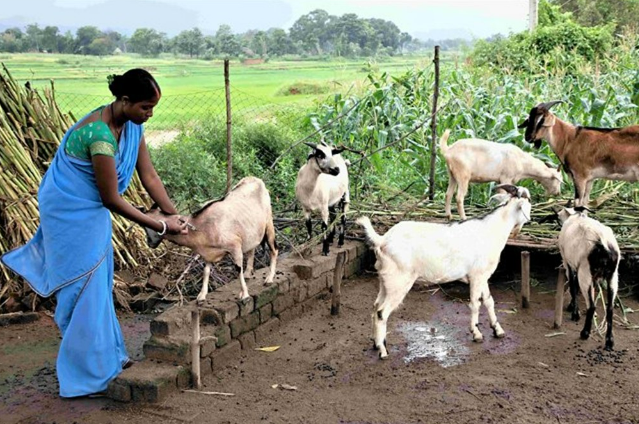Recently, the World Bank funded the 'Pashu Sakhi' project that trains village women in basic livestock care. This project has led to a dramatic change in the perception of society towards women and the manner in which domestic animals are reared.
Around 45 km from Ranchi, in a village called Ranchi, Janu Devi, 27, is excited about the ice box she has just received.
She's one of five women from the pashu sakhi - meaning friend of animals - community in Jharkhand's Tamar block office to get the box that stores vaccination vials for goats, poultry, and pigs.
For the management of livestock effectively, Devi has joined hands with about a thousand women across all 24 districts of Jharkhand, recruited since 2013. These women provide door-to-door service whenever they are called upon. Formally, called community animal care service providers and are informally known as doctor didis. They recommend farmers go for regular health check-ups for their livestock, vaccinations, de-worming, hygiene, breeding, feeding, and the management of animal waste.
The project was planned under the National Rural Livelihood Mission with the objective of building a line of community resource persons. Later, in 2017-18, the Jharkhand Opportunities for Harnessing Rural Growth (JOHAR) took the project under it's wing and the World Bank started to fund it. The data reveals that there are some 60,000 farmers who benefit out of this programme.
As an outcome of the initiative, the mortality rate of goats has come down by about 30% and poultry by 40%. The average income of the farmers has also risen. Production has also increased manifold.
Instrumenting Social Change:
The Pashu Sakhi model under JOHAR had been selected by the UN's Food and Agriculture Organisation and the International Food Policy Research Institute as one of the top eight global best practice models for farmer service delivery.
The success of the women is because of their professional success and the income they have brought in for their families. Of course, they have well equipped themselves with the practices of animal rearing.
Janu Devi is a master trainer who began as a pashu sakhi in 2018 and earned well. Her family has recently revamped the roof structure of their house. Around lakh rupees were spent on it and it was only possible as she worked as a master trainer. With her income, she has helped her husband to get a bike.
In Bhakur-Tungari village, everyone knows Balamdina Tirkey as the woman who comes around on her moped, to deliver her services to about a hundred households. She has been awarded by several organisations and is so busy that it's difficult to meet her.
Aloka Devi, 30, from Ragra-Baran village, Tamar block, recently took a loan from a nationalised bank to buy a tractor for her husband.
The Pashu Sakhi Model:
The livestock production of Jharkhand is in the hands of marginal and landless farmers. Many of the Pashu Sakhis own livestock themselves.
There are no strict guidelines to be a pashu sakhi except for the women to be living in the village they service. Women with outdated mobile phones are trying to stay in touch with villagers. They keep records of the vaccination of livestock.
They are put through a three-level (introductory, practical, and upper) 30-day training programme over seven-day tranches teaching them how to take care of the livestock. After the training is complete, they provide technical assistance on the management of livestock. Awareness is being developed among fellow farmers on the economic benefits of rearing livestock for sale. Farmers are provided support so they can get access to the best market for selling their produce. Furthermore, training of some 45 days is required for the management of livestock. The model aims to provide a high but common standard of services.
. . .
Reference:
- https://thehindu.com
- https://optimizeias.com

